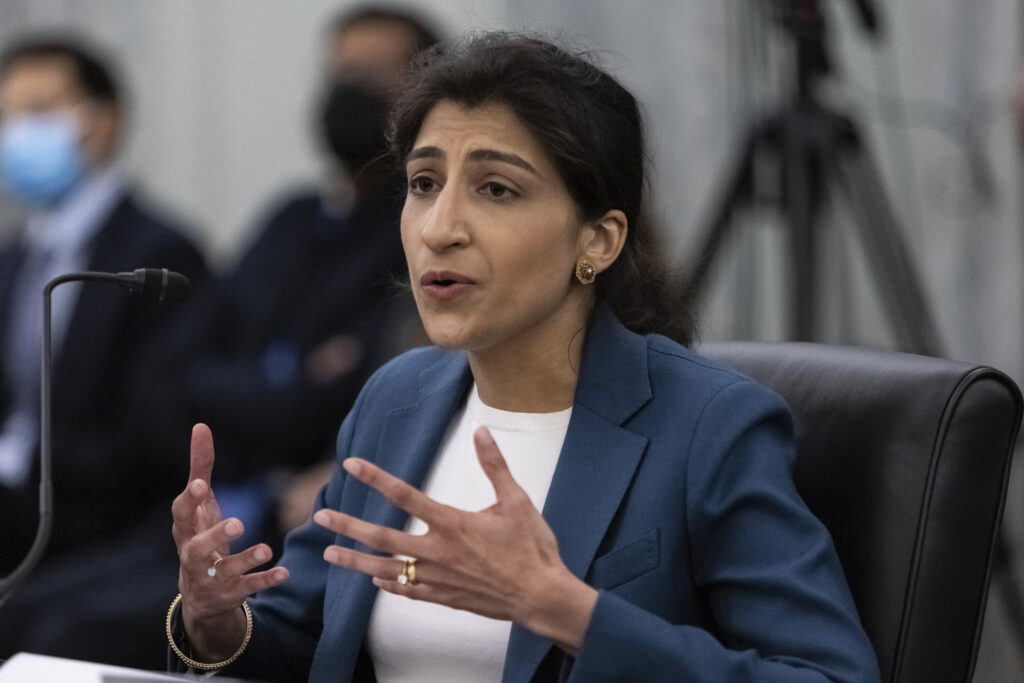
OP-ED
Seeking Her (Whale) Bones, Lina Khan Aims to Kill Amazon In Its Present Form
By Robert Bork Jr., July 10, 2023
In well-placed leaks to the media, Lina Khan is signaling that the depth and breadth of her long-anticipated antitrust lawsuit against Amazon will exceed anything the ambitious, ideology-driven Federal Trade Commission Chair has yet attempted.
Many have attributed this to sheer animus. Khan famously made her reputation as the wannabe intellectual leader of progressive antitrust with her breakthrough attack on the retailer and e-commerce giant in a widely celebrated (and perhaps over-celebrated) law journal note while she was still a student at Yale Law School.
As FTC Chair, Khan has sued Amazon three times before, most recently for allegedly making it hard for consumers to cancel their Amazon Prime membership. This story was detailed in The New York Times, a media outlet that itself is notorious for being hard to cancel. (The Times forces subscribers to explain why they are canceling and even diverts them to “chats” with representatives. By comparison, cancelling Amazon Prime is a breeze.)
But with this fourth suit, a wide-ranging antitrust case, Lina Khan is not seeking to discomfit Amazon, but to kill the company in its present form. She’s reported to have been personally sharpening questions for investigators and revising the draft of the complaint. She has made it clear that Amazon won’t be allowed to wiggle out with a compromise. This one is to the death.
But why? It’s easy to understand why Captain Ahab in Moby Dick hated the white whale that took his leg. What explains Khan’s long-standing hostility to a popular retailer? Perhaps her case is based more on ambition than animus.
Criticizing Amazon as a law student made her reputation. If she can now kill Amazon as an integrated company, Lina Khan will have made her (whale) bones. She undoubtedly sees this as her legacy – that breaking up Amazon would be in her eyes a landmark achievement akin to breaking up Standard Oil and AT&T.
The FTC’s case will claim there is something exploitive about Amazon’s integration of logistics with retail, the many advantages it offers to Prime subscribers, and the one-click “Buy Box” it offers merchants with superior metrics. Khan’s case seems to rest in part on the idea that by enticing consumers into subscriptions that include unlimited music, free delivery, Audible, groceries, and streaming, Amazon is exploiting the naïve consumer. Like all progressives, Khan sees consumers as lacking agency. Poor proles, they are powerless before the likes of Jack Ryan and The Marvelous Mrs. Maisel.
At the heart of this mishmash of charges will be an attack on Amazon’s logistics. What Khan sees as an unfair advantage is in fact an achievement of staggering scale that summoned the ingenuity of hard-working people who transformed hundreds of billions of dollars of investment into a logistical system that rivals those of Walmart and the Pentagon. This is what makes Amazon such a gem of an American company. Anyone can sell stuff on the internet; none can deliver like Amazon.
The American people understand this. Perhaps that is one reason why a recent Harris/Harvard poll showed that in 2021 Amazon was the second most trusted American institution, behind only the U.S. military. Clearly, consumers – remember them, the people antitrust is meant to protect? – trust Amazon to give them a good deal.
As Khan proceeds, a federal judge may remind her there are differences between the landmark Standard Oil and AT&T cases and Amazon. Standard Oil literally had America over a barrel. And everyone needed AT&T’s telephone service. Both were monopolies. Amazon is not.
Last year, Amazon accounted for just 6.5 percent of consumer retail spending, beat by Walmart with 7.1 percent. Amazon is clearly the dominant online retailer, but its 37.8 percent of online retail is continuously threatened by Walmart, Apple, Target, eBay, and a host of other savvy competitors.
After the end of the pandemic, Amazon.com became the first public company to lose a trillion dollars in market value. Amazon stock has since rallied somewhat, with the company finding new sources of revenue. The company continues to fight stiff competition, famously obsessed with consumers, reciprocated by high levels of consumer trust and engagement. This is hardly a villain out of central casting.
If Khan were to break Amazon, consumers would lose access to services they clearly value. Merchants would lose a prized path to consumers. And Jack Ryan might have to put away his night vision goggles and wash cars for a living.
Worse, such a breakup would be a triumph of unreasoning ideology over a principled approach to antitrust, which exists to protect consumers. Perhaps antitrust enforcers should start by listening to them.
As Lina Khan chases her white whale, she can burst her hot heart’s shell upon the beast like a mortar. But don’t forget that in Moby Dick, the whale wins.
Robert H. Bork, Jr., is the president of the Antitrust Education Project.
Originally published at Real Clear Markets.

